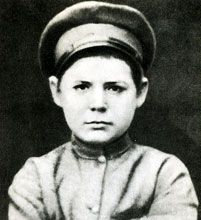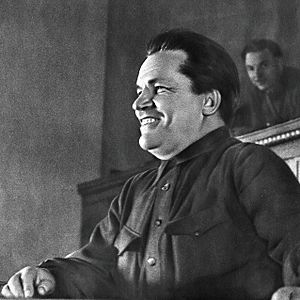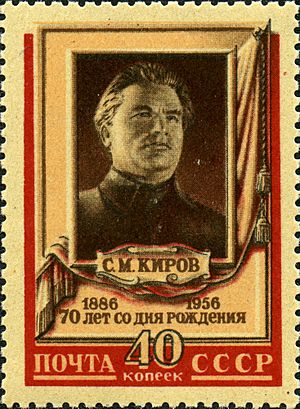Sergei Kirov facts for kids
Quick facts for kids
Sergei Kirov
|
|||||||||||||||||
|---|---|---|---|---|---|---|---|---|---|---|---|---|---|---|---|---|---|
|
Серге́й Миро́нович Ки́ров
|
|||||||||||||||||
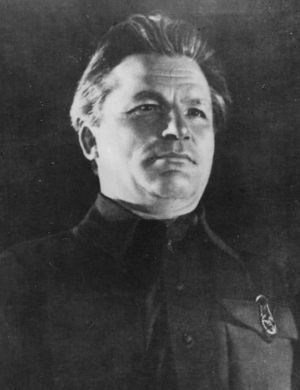
Kirov c. 1930s
|
|||||||||||||||||
| First Secretary of the Central Committee of the Azerbaijani Communist Party | |||||||||||||||||
| In office July 1921 – January 1926 |
|||||||||||||||||
| Preceded by | Grigory Kaminsky | ||||||||||||||||
| Succeeded by | Levon Mirzoyan | ||||||||||||||||
| First Secretary of the Leningrad Regional Committee of the All-Union Communist Party (Bolsheviks) | |||||||||||||||||
| In office 1 August 1927 – 1 December 1934 |
|||||||||||||||||
| Preceded by | Post established | ||||||||||||||||
| Succeeded by | Andrey Zhdanov | ||||||||||||||||
| First Secretary of the Leningrad City Committee of the All-Union Communist Party (Bolsheviks) | |||||||||||||||||
| In office 8 January 1926 – 1 December 1934 |
|||||||||||||||||
| Preceded by | Grigory Yevdokimov | ||||||||||||||||
| Succeeded by | Andrey Zhdanov | ||||||||||||||||
| Full member of the 16th, 17th Politburo | |||||||||||||||||
| In office 13 July 1930 – 1 December 1934 |
|||||||||||||||||
|
|||||||||||||||||
| Personal details | |||||||||||||||||
| Born |
Sergei Mironovich Kostrikov
27 March 1886 Urzhum, Vyatka Governorate, Russian Empire |
||||||||||||||||
| Died | 1 December 1934 (aged 48) Leningrad, Russian SFSR, Soviet Union |
||||||||||||||||
| Cause of death | Assassination | ||||||||||||||||
| Resting place | Kremlin Wall Necropolis, Moscow | ||||||||||||||||
| Political party | RSDLP (Bolsheviks) (1904–1918) All-Union Communist Party (Bolsheviks) (1918–1934) |
||||||||||||||||
Sergei Mironovich Kirov (born Kostrikov; 27 March 1886 – 1 December 1934) was an important Russian and Soviet politician. He was a Bolshevik revolutionary, which means he believed in a political system where workers control the government.
Kirov was an early revolutionary in the Russian Empire. He was a member of the Bolshevik group within the Russian Social Democratic Labour Party. Kirov became an "Old Bolshevik," meaning he was one of the early members of the party. He was also a personal friend of Joseph Stalin. Kirov rose through the ranks of the Communist Party of the Soviet Union. He became the head of the party in Leningrad and a member of the Politburo. The Politburo was the main decision-making group in the Soviet Union.
On 1 December 1934, Kirov was shot and killed by Leonid Nikolaev in his office. The reasons for this act are still not fully known. Nikolaev and others were quickly put on trial and executed. Kirov's death was later used by Stalin as a reason to increase political control. This led to a period of great political arrests and executions called the Great Purge. Kirov's assassination remains a controversial and unsolved event. There are different ideas about what really happened.
Contents
Early Life and Education
Sergei Mironovich Kostrikov was born on 27 March 1886. His birthplace was Urzhum in the Russian Empire. He was one of seven children. Sadly, four of his older siblings died young.
Sergei's father left the family around 1890. His mother died from tuberculosis in 1893. Sergei and his two sisters were cared for by their grandmother for a short time. However, she could not afford to raise all of them. So, Sergei was placed in an orphanage when he was seven. He still saw his sisters and grandmother often.
In 1901, some wealthy people helped Kirov get a scholarship. This allowed him to attend an industrial school in Kazan. After finishing his engineering degree, Kirov moved to Tomsk in Siberia. There, he became a Marxist and joined the Russian Social Democratic Labour Party in 1904.
Becoming a Revolutionary
Kirov took part in the 1905 Russian Revolution. He was arrested and joined the Bolsheviks after being released. In 1906, he was arrested again. This time, he was jailed for over three years for printing illegal writings. After his release, Kirov continued his revolutionary work. He was arrested again for the same reason.
After a year in jail, Kirov moved to the Caucasus region. He stayed there until Tsar Nicholas II gave up his throne in March 1917. This event was part of the February Revolution.
Around this time, Kirov changed his last name from Kostrikov to Kirov. Many Russian revolutionaries did this. He started using the pen name "Kir" and first used "Kirov" on 26 April 1912. One story says he chose "Kir" from the Greek name Cyrus, after a Christian saint. Another story says he based it on the Persian king Cyrus the Great.
Kirov became a commander for the Bolshevik military in Astrakhan. He fought for the Red Army during the Russian Civil War until 1920. During this time, he was known for being a tough political leader.
Political Career
In 1921, Kirov became the First Secretary of the Communist Party of Azerbaijan. This was the Bolshevik party in Azerbaijan. Kirov was a very loyal supporter of Joseph Stalin, who took over leadership after Vladimir Lenin.
In 1926, Kirov was given an important role. He became the head of the party organization in Leningrad. Kirov was a close personal friend of Stalin. He strongly supported Stalin's plans for industrialisation (making the country more industrial) and forced collectivisation (combining small farms into large state-controlled ones).
At a big party meeting in 1930, Kirov spoke about these plans. He said the main goal was to industrialize the country. He also said that this industrialization would help change agriculture by making it more centralized and collective.
In 1934, at another important party meeting, Kirov gave a speech. He praised Stalin for everything he had done since Lenin's death. Kirov also criticized some former allies of Stalin. These people were later blamed for Kirov's death.
Kirov's Public Image
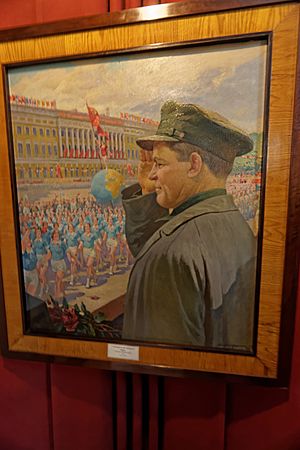
After Kirov's death, some people said he had often disagreed with Stalin in private. They also said he became so popular that he was a threat to Stalin's power. Kirov did show some independence from Stalin. For example, in 1932, Stalin wanted to execute someone who had criticized him. But Kirov and another leader convinced Stalin not to.
Some stories suggest Kirov often clashed with Stalin. Kirov was known for being simple and approachable. He lived in a large house with many other people. He walked to work and explored the city streets. He even played with children in his yard. This was different from Stalin, who lived in the heavily guarded Kremlin. This made Kirov seem more connected to ordinary people.
At a party meeting in 1934, Kirov reportedly received more votes than Stalin for a leadership position. Some say that ballots were destroyed so that Stalin and Kirov would appear to have the same number of votes. Some historians believe Kirov might have become a leader for those who wanted to oppose Stalin's rule.
Kirov also didn't always do exactly what Stalin wanted. For instance, Stalin wanted Kirov to move to Moscow permanently. While others would have agreed, Kirov refused to leave Leningrad. Stalin had to accept this. Also, when Stalin wanted to move a police official from Leningrad, Kirov again refused, and Stalin had to give in.
However, it's also important to know that Kirov received many gifts from people and businesses. A museum in St. Petersburg shows these gifts. Some suggest these were gifts given to gain Kirov's favor. One person who knew Kirov described him as a powerful official. He said that Kirov was disliked by many, but people felt helpless to do anything about it.
The Assassination of Sergei Kirov
Leonid Nikolayev, the man who killed Kirov, was known to the NKVD (the Soviet secret police). He had been arrested for small crimes before. Nikolayev was a former party member who had lost his job and was having money problems.
On 15 October 1934, Nikolayev was arrested at Kirov's office building. He had a loaded gun in his briefcase. Strangely, his gun and briefcase were returned to him, and he was told to leave. Some reports say that Kirov's usual bodyguards were removed before the assassination. On 1 December 1934, the guard post at Kirov's office was empty. Only one unarmed bodyguard was with Kirov. This lack of security for such an important official was very unusual.
Kirov was killed and his ashes were placed in the Kremlin Wall necropolis in Moscow. Stalin and other top Communist Party members carried his coffin.
Aftermath of the Assassination
After Kirov's death, Stalin demanded quick punishment for those responsible. Nikolayev was tried secretly and executed on 29 December 1934. The Soviet government, led by Stalin, claimed Nikolayev was part of a secret group. Kirov's bodyguard died the day after Kirov, reportedly falling from a truck. Nikolayev's friend, who supposedly gave him the gun, was also later killed.
Several NKVD officers from Leningrad were found guilty of not protecting Kirov well enough. They were sentenced to prison, but some reports say they were instead moved to other jobs. Later, some of these officers were shot.
Many people were blamed for Kirov's death, even those who had no clear connection to Nikolayev. Stalin used Kirov's assassination to remove his political opponents. He accused leaders like Grigory Zinoviev and Lev Kamenev of being "morally responsible" for the murder. Some historians believe Stalin arranged the murder with the secret police.
Kirov's assassination became a major event in Soviet history. Stalin used it as an excuse to start the Great Purge. This was a time of widespread arrests, trials, and executions. Some compared it to the burning of the Reichstag in Nazi Germany, which was used to persecute Communists. The goal was to remove a potential rival (Kirov) and to create a reason for more control and repression.
Later, in 1956, Nikita Khrushchev, a Soviet leader, suggested that NKVD agents organized Kirov's murder. He said that the NKVD agents who were supposed to protect Kirov were later shot to hide the truth. However, some historians, after looking at Soviet records, say there is no strong proof that Stalin or the NKVD directly planned Kirov's murder. They argue that ordering Kirov's death didn't make political sense for Stalin at that time.
Investigations into Kirov's Death
In December 1955, a special group called the Pospelov Commission was formed. Its job was to investigate the political arrests of the 1930s. This commission heard from people who believed there were unexplained things about Kirov's murder. One former NKVD officer reportedly said that Nikolayev claimed he was following instructions from the "Chekists" (NKVD agents) and pointed to them in the room.
Later, in 1989, another commission was set up during Mikhail Gorbachev's time. This group included people from different Soviet legal and security departments. After two years of looking into the case, they concluded that there was no clear evidence to show Stalin or the NKVD were involved in planning Kirov's murder.
Legacy and Remembrance
Many places, streets, and factories in Russia were named after Kirov. These include the cities of Kirov (formerly Vyatka) and Kirovsk. Other places named after him were in Ukraine, Azerbaijan, and Armenia. The Mariinsky Ballet was once called the Kirov Ballet. The large Kirov Plant in Saint Petersburg was also named for him.
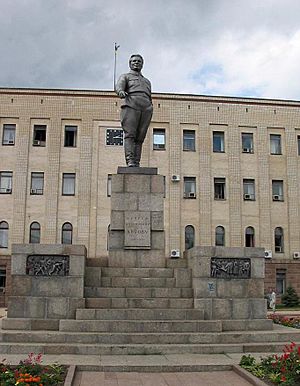
Since the Soviet Union ended in 1991, many places named after Kirov have been renamed. This is especially true outside of Russia. For example, in Ukraine, Kirovohrad was renamed Kropyvnytskyi in 2016. A large statue of Kirov in Baku, Azerbaijan, was taken down in 1992.
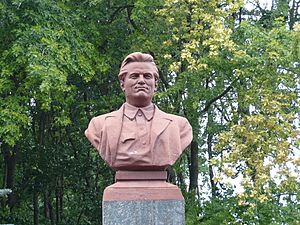
The Kirov Prize is an old speedskating competition named after him. Several ships and even an airplane were also named Kirov.
Personal Life
Kirov was married to Maria Lvovna Markus from 1911, though they never officially registered their marriage. A woman named Yevgenia Kostrikova (1921–1975) claimed to be Kirov's daughter. She was a famous tank commander during World War II.
Honours and Awards
- Order of Lenin
- Order of the Red Banner
See also
 In Spanish: Serguéi Kírov para niños
In Spanish: Serguéi Kírov para niños
- List of unsolved murders
- Red Terror
 | Charles R. Drew |
 | Benjamin Banneker |
 | Jane C. Wright |
 | Roger Arliner Young |


